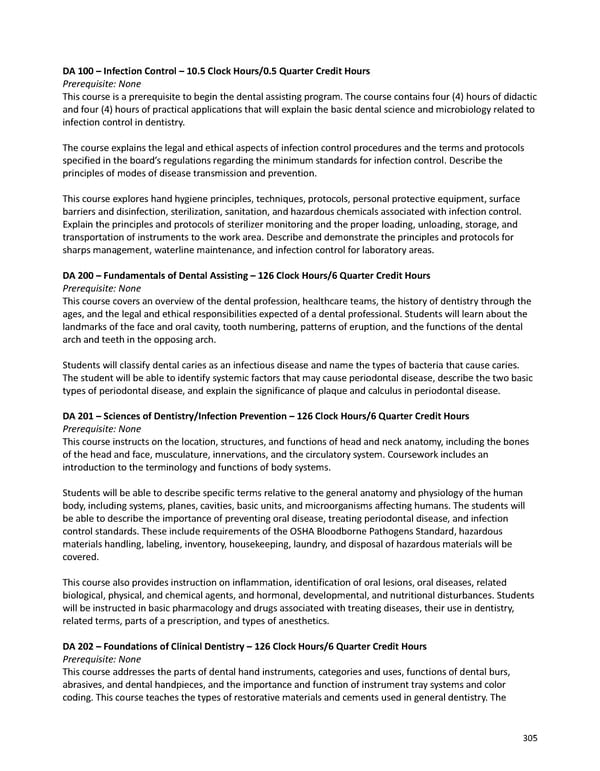DA100–InfectionControl–10.5ClockHours/0.5QuarterCreditHours Prerequisite: None This course is a prerequisite to begin the dental assisting program. The course contains four (4) hours of didactic andfour(4)hoursofpracticalapplications that will explain the basic dental science and microbiology related to infection control in dentistry. Thecourseexplainsthelegalandethicalaspectsofinfectioncontrolproceduresandthetermsandprotocols specified in the board’s regulations regarding the minimum standards for infection control. Describe the principles of modes of disease transmission and prevention. This course explores hand hygiene principles, techniques, protocols, personal protective equipment, surface barriers and disinfection, sterilization, sanitation, and hazardous chemicals associated with infection control. Explain the principles and protocols of sterilizer monitoring and the proper loading, unloading, storage, and transportation of instruments to the work area. Describe and demonstrate the principles and protocols for sharps management,waterlinemaintenance,andinfectioncontrolforlaboratoryareas. DA200–FundamentalsofDentalAssisting–126ClockHours/6QuarterCreditHours Prerequisite: None This course covers an overview of the dental profession, healthcare teams, the history of dentistry through the ages, and the legal and ethical responsibilities expected of a dental professional. Students will learn about the landmarksofthefaceandoralcavity,toothnumbering,patternsoferuption,andthefunctionsofthedental arch and teeth in the opposing arch. Students will classify dental caries as an infectious disease and name the types of bacteria that cause caries. Thestudentwillbeabletoidentifysystemicfactorsthatmaycauseperiodontaldisease,describethetwobasic types of periodontal disease, and explain the significance of plaque and calculus in periodontal disease. DA201–SciencesofDentistry/InfectionPrevention–126ClockHours/6QuarterCreditHours Prerequisite: None This course instructs on the location, structures, and functions of head and neck anatomy, including the bones of the head and face, musculature, innervations, and the circulatory system. Coursework includes an introduction to the terminology and functions of body systems. Students will be able to describe specific terms relative to the general anatomy and physiology of the human body, including systems, planes, cavities, basic units, and microorganisms affecting humans. The students will beabletodescribetheimportanceofpreventingoraldisease,treatingperiodontaldisease,andinfection control standards. These include requirements of the OSHA Bloodborne Pathogens Standard, hazardous materials handling, labeling, inventory, housekeeping, laundry, and disposal of hazardous materials will be covered. This course also provides instruction on inflammation, identification of oral lesions, oral diseases, related biological, physical, and chemical agents, and hormonal, developmental, and nutritional disturbances. Students will be instructed in basic pharmacology and drugs associated with treating diseases, their use in dentistry, related terms, parts of a prescription, and types of anesthetics. DA202–FoundationsofClinicalDentistry–126ClockHours/6QuarterCreditHours Prerequisite: None This course addresses the parts of dental hand instruments, categories and uses, functions of dental burs, abrasives, and dental handpieces, and the importance and function of instrument tray systems and color coding. This course teaches the types of restorative materials and cements used in general dentistry. The 305
 2023-2024 | Catalog Page 304 Page 306
2023-2024 | Catalog Page 304 Page 306